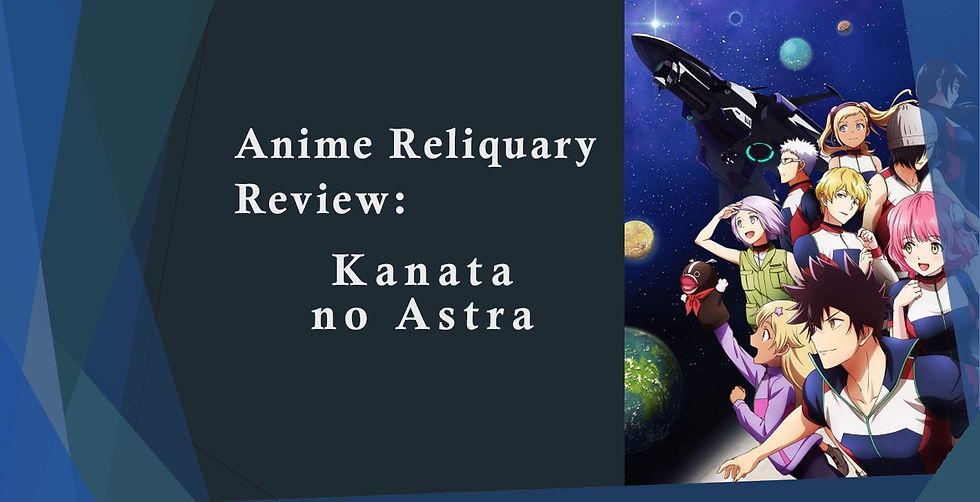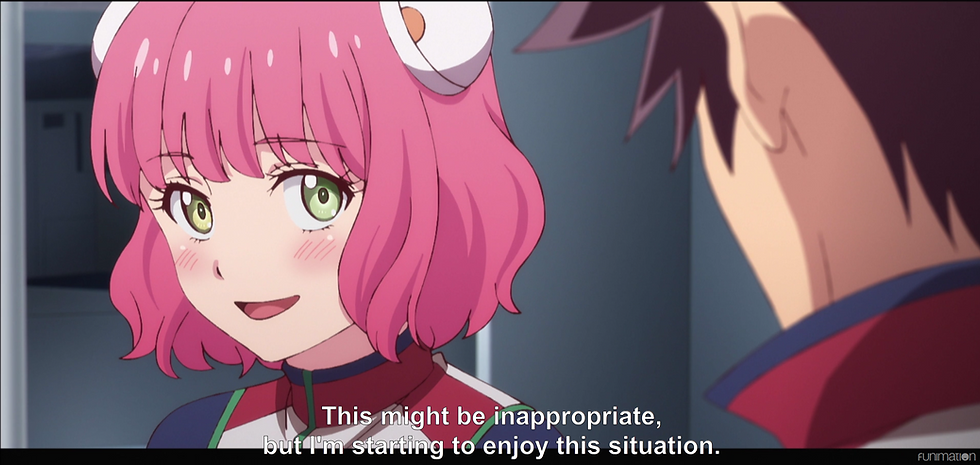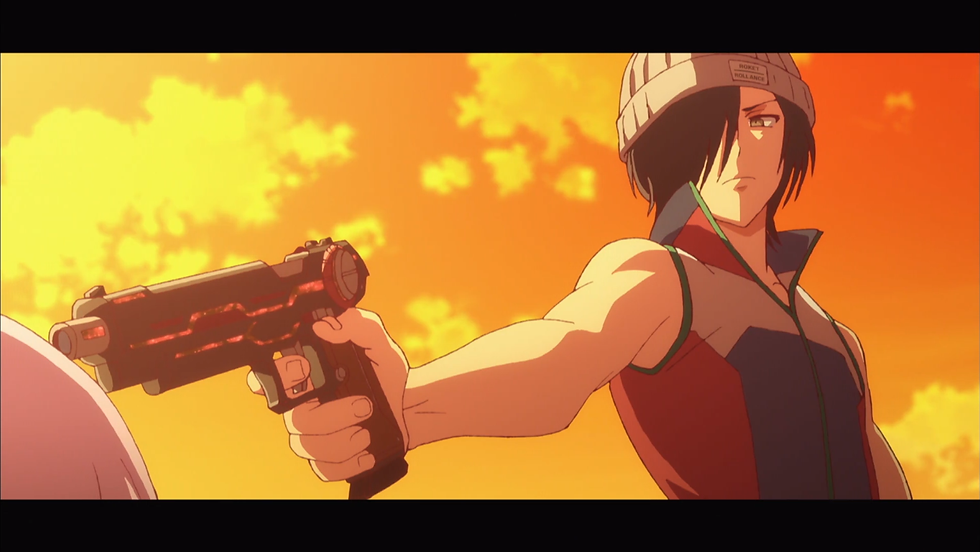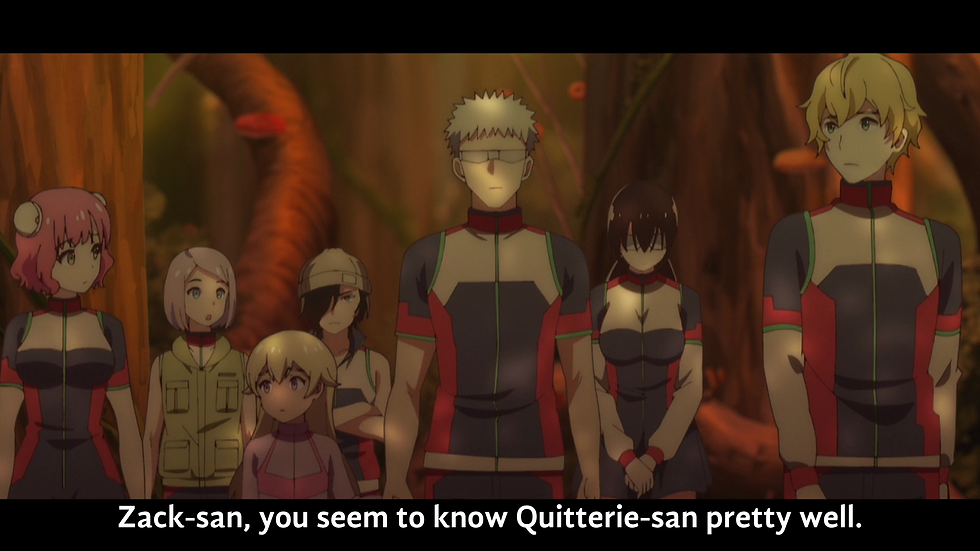Anime Review: Kanata no Astra
- Joseph Lutholtz
- Oct 26, 2019
- 7 min read

Alternative Names: Astra Lost in Space
Scores: 10/10, 5/5
Length: 12 Episodes
Genre: Sci-fi, Adventure, Mystery, Drama, Comedy
Availability: Available subbed via Funimation
Mysteries, like comedies, are always something of a difficult genre for me to review. Teasing out the nature and general flow of a show's mystery, as I see it, is just as harmful to new viewers as explaining the jokes from a comedy. At best it's just a boring way to talk about a show and, at worst, it spoils the fun of the big reveal. Since half the fun of watching a "whodunit" is puzzling things out alongside the characters, over-explanation and over-evaluation would rob the viewer of learning and solving the same things the same way. Yet, in the case of Kanata no Astra, I'm not sure that's necessarily true. Unlike most mysteries, the fun doesn't necessarily come from puzzling out its elaborate mystery so much as watching the characters react to revelations that sound obvious at a glance but are easily ignored because of how conveniently they fit with the tropes and archetypes we've been trained to just accept as "normal" for anime. Rather than being hidden beneath a mound of lies, deception, and misdirection, the truths that are steadily revealed throughout the series are all just hiding out in the open--begging to be underestimated.

Seriously; just look at this picture of most of the cast. Any assumptions and all you can draw at a glance
are probably accurate and an important part of the show's larger mystery.
Being underestimated is this show's bread and butter, though. As I mentioned in my Seasonal Summary, watching this series was more or less a constant battle against my getting comfortable with all the usual quirks and gimmicks I've come to take for granted in anime. From little choices in character design to the way those characters' personalities interact in a group: all the little things I and so many others have just assumed to be the norm are turned into legitimate points of interest in Kanata no Astra. Let's take, for example, the introduction and main premise of the series. In the beginning, we are introduced to a world where space travel has gotten so advanced and secure that it has become a common, global pastime. Rather than fleeing South for the winter, humanity is free to weather out the weather on another planet entirely. Rather than hiking in the woods, more adventurous people have the freedom to trek across the stars. In the case of Kanata no Astra, though, this development is used as a kind of replacement for you basic Summer Camp or school field trip. Rather than sitting under a shelter and weaving baskets, the show's cast of teens are shipped off to another planet and given a task that'll help them build their problem solving, teamwork, and leadership skills. From the very beginning, though, it's clear that there's something strange about this school field trip. First, a brand-new transfer student is participating on this trip. Second, one of the students is being forced to take her little sister with her. Third, most of these kids have never met before now. Given that this is an anime, though, it's easy to wave away these quirks of the story. The sudden introduction and induction of new transfer students is, after all, a common anime gag. The same can also be said of the inclusion of a younger child character since lots of kids shows make sure to include at least one child character so that very young kids can have someone they identify with. Pretty much any and every oddity you might note at the beginning of this series can be easily be waved away as a simple contrivance for what you expect to be a relatively simple show. Yet, once the story actually gets going, it quickly becomes clear that this show is anything but simple.

Simplistic, sure, but not simple.
The thing that makes this series such a delight is, quite simply, how intentional and planned it all feels. Rather than just stringing along a plot or following the misadventures of the cast for an eternity, Kanata no Astra's story actually follows a strict but believable structure. In other words, this works because it always stays lazer-focused on its planned course. While following that course, Kanata no Astra thrives as it plays with expectation and steadily drip-feeds its larger mystery while the each episode mainly concerns itself with showcasing its planet-of-the-day and letting the cast learn more about each other and themselves. Because of how straightforward a lot of these characters are and how plotted out their journey is, it becomes that much easier to forget that there is a mystery looming in the background. Namely, once the cast have been properly introduced and sent on their way, everything goes horribly wrong. Within a matter of minutes of landing on the safe, team-building planet, they end up getting sucked into a worm hole and deposited into empty space beside a derelict spaceship light years away from home. Forgetting their petty squabbling and working together to survive this incredible ordeal, the cast pull themselves onto the ancient ship they dub The Astra. With this quick escalation of events, all those niggling contrivances are also forgotten as we are engaged with watching the cast come together as a crew and plot out how they are going to get home safely by planet hopping. With that core goal established, each episode becomes an episodic adventure as the crew gather the food and water necessary for their survival on these strange, uninhabited planet. Pair that thrill of the unknown with some solid character drama that gives every member of the crew their moment to shine or clash with their less agreeable companions and you start to see why they might forget or opt to overlook the fact that they ended up in the situation because of a botched assassination attempt. More specifically, the cast simply agree that they should all focus on surviving, rather than waste their effort trying to hunt down their would-be-killer, since going at each other's throats would only get them killed in the long run.

Unless, of course, getting someone killed was their goal all along.
With this agreement to a ceasefire, though, comes the opportunity for the series to plot out its adventure, character drama, and mystery in such a way that it almost feels like a long and complex game of CLUE. Like any good "whodunit" story, each of the characters have something that they bring to the table that could justify thinking that they are the killer. Each have a personal agenda that they pursue while also simply trying to survive. All the while, though, as the crew bickers, squabbles, and tries to find reasons to doubt one another, the real killer is putting their own plans in motion to ensure that their mission is a success. While this mystery builds and forces the crew to engage with one another, though, the show mainly focuses on the crew bonding over their shared struggle and working together to survive each new planet. This way we're given more reasons to care about each and every one of them. At the same time, though, as things repeatedly go wrong on their journey, both we and the cast are forced to question if these problems are simple coincidences or repeated assassination attempts. That question and renewed tension among the crew then turns into an easy means for the cast to start pointing fingers all over again, forcing the accused to explain more and more about who they are, what their private agenda is, and why they couldn't possibly be the killer. Of course, there's never any guarantee that they are being honest, though, since none of them have the knowledge or ability to contest each other's story.

What's that?! Characters that are not only capable of lying but are genuinely inclined to do so because
they have secrets and skeletons they're rather keep buried? Say it ain't so!
Red herrings, false assumptions, and outright deception abound in this fantastic mystery full of conflict, adventure, and semi-sweet dollop of romance. Yet, as complex, expansive, and thorough as Kanata no Astra's mystery might be, it still manages to never become so complex that its impossible to follow. Since most of this show's mystery is steadily drip-fed, the series is content to let us revel in the characters and their adventure for a good 80% of each episode until something inevitably goes wrong. That way, the remaining 20% gives us and the crew plenty of time to work out how the recent crisis fits into the larger mystery. That way, by the series' end, that gradual buildup of detail can logically turn into a conclusion that answers both the "whodunit" and the "whydunit." Even with that problem solved, though, the series doesn't just end with the cast airlocking the assassin and making it home without further complications. Once that one conclusion is reached, its also made clear that this whole adventure was orchestrated by more than just a single person. Because of all the effort and investment put into the assassination of this specific group of kids, it soon becomes clear that the assassin was little more than a tool of a much larger conspiracy--one that puts the very history of their peaceful, space fairing world into question.

Did I mention how much I appreciate this show's honest, straightforward approach to romance.
Regardless of how big the conspiracy gets or how dangerous things get, though, the overall tone and standard of Kanata no Astra offers some reassurance that everything will turn out well for its characters in the end. Much like any good Disney movie, any and every bad thing that happens to the cast during their journey only reinforces their dedication to one another and the surety that, when everything is said and done, they'll be able to go home happy, healthy, and very much alive. Perhaps that realization comes from the series' overall light, adventurous tone or maybe that assurance just comes from how certain they all are that they will get back home. Regardless of which it is, though, this series somehow manages to conduct itself in the same manner you'd expect from a kids' show while also having a cast of characters and story that make it feel like so much more. From the way the series constantly forces you to underestimate it to its slow but steady build-up of a much larger narrative, Kanata no Astra proves itself to be a masterfully told and manipulated story. Out of all the anime I've seen that I'd label "for kids," this series is second to none. Of course, it is also just a very good Sci-fi story in its own right. Now, if my vaguely coherent rambling has piqued your interest, I'd wholly recommend giving it a chance. If you've already seen it and want a more spoiler-y opinion on the series, feel free to let me know via e-mail or the Facebook page. I'm always happy to discuss the finer points of good shows anytime.


Comments